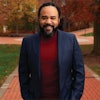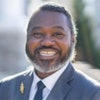Dr. Cristobal “Criss” Salinas Jr.
Title: Associate Professor of Higher Education Leadership and Faculty Coordinator, Leadership Studies, Educational Leadership and Research Methodology, Florida Atlantic University.
Education: B.A., Spanish education, English as a Second Language; University of Nebraska at Kearney; master of education, student affairs and higher education, Iowa State University; Ph.D., higher education administration, Iowa State University
Age: 35 Mentors: “I’m afraid that if I say names, I will forget names, because there are so many people who have had an impact on my life. But I want to credit Black women because Black women have mentored me more than anyone else.”
Words of encouragement/wisdom: “The academy is tough but create your research and goal — set and try to accomplish it and find mentorship. Get mentorship from White faculty who have a lot of power and look for mentorship outside of your institution.”
By most standards, Dr. Cristobal “Criss” Salinas Jr. is a productive scholar. A tenured associate professor in the Department of Educational Leadership and Research Methodology at Florida Atlanta University, Salinas has published over 22 peer-reviewed articles and more than 27 book chapters and co-edited five books. He is also the founder and editor-in-chief of the Journal Committed to Social Change on Race and Ethnicity (JCSCORE).
The accolades for Salinas are many, including receiving over 25 international and national awards for his expansive research that focuses on promoting access and equity in higher education. An expert on Latinx students in college, the 35-year-old has emerged as a popular media pundit, offering commentary on CNN, NPR, Telemundo and “Good Morning America."
Born in Mexico, Salinas’ family was thrown into turmoil after his father was kidnapped by police officers in a neighboring town. The family fled to Nebraska, where Salinas was often the only Latino in middle and high school.
“It gave me a lot of context for growing up in White America,” says Salinas, adding that he quickly found that, despite racism, White educators also emerged as some of his biggest supporters, providing the mentorship he needed in order to progress as a first-generation American student.
“I knew I wanted to have a positive impact on students,” he says, recalling an ugly encounter that he had during his undergraduate years when another student threatened him after he announced his candidacy for student government president. The incident was racial.
“That really made me think and reflect more about how there are more people who look like me and sound like me and there is no one advocating for them and so that is one of the reasons why I wanted to continue with my educational career in higher education.”
After graduating from University of Nebraska at Kearney with a bachelor’s in Spanish education and English as a Second Language (ESL), Salinas taught for seven months at the Alief Elsik High School in Houston, Texas, before enrolling in a master’s program in student affairs and higher education at Iowa State University in 2010. He graduated from the program two years later, all while holding down a full-time position as the multicultural liaison officer and academic advisor for the College of Design at Iowa State.
Initially, he was interested in being a college administrator, but, after finishing the higher education administration doctoral program at Iowa State University in 2015, Salinas turned his focus to becoming a faculty member.
“My focus was on Latino men faculty. I wanted to become one, so I wanted to understand what were their experiences,” he notes, adding that he never had a Latino/a instructor in the U.S. until he enrolled in graduate school.
Now, in his seventh year at Florida Atlantic University, his ambitious research has expanded, focusing more on the term Latinx.
“I think there are many challenges,” he says overall about the plight that so many Latinx students face in college, including “the lack of support” while pursuing their academic goals. His decision to take a faculty role at Florida Atlantic University was fueled by the burgeoning and diverse populations of Latinx people in the Sunshine State.
A rising star in academe, he hopes to become a full professor and one day take on some administrative duties, all with the goal of helping students of color. “His research is critical in helping people unpack the issue of Latinx/a/o terminology, as he urged us to utilize the term Latinx more thoughtfully, explore our own positionalities and understandings of the term,” says Dr. Cristóbal Rodríguez, associate dean of equity, inclusion, and community engagement and an associate professor of educational leadership & policy studies at Arizona State University.
Rodríguez notes that, according to Google Scholar, Salinas’ groundbreaking article on the term Latinx has been cited 330 times and is the most cited article in the Journal of Latinos and Education.
“Criss’ research on the term Latinx has been critical to understanding the history, evolution and contemporary usage of the term in educational research and practice,” says Rodríguez. “His research is impactful for scholars and practitioners.”















